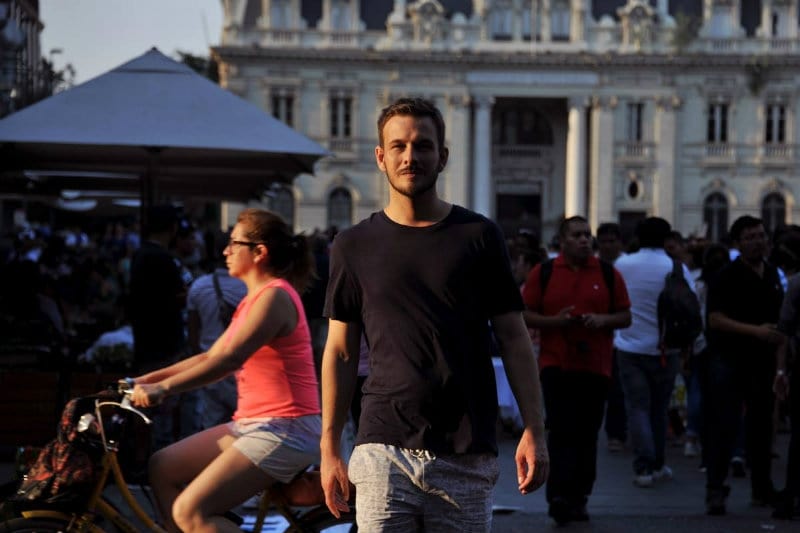
By Darius Zheng/Special to The Santiago Times
SANTIAGO – You might have seen an article we ran three weeks ago on a group of Chileans turning up in pink triangles outside the Ministry of Foreign Affairs in the Chilean capital to protest against the gay concentration camps in Russia’s Chechnya. If you remember that story, then perhaps you may also have some recollection of a mention of Luis Larrain in the article, who organized the protest. But besides recognizing Larrain as the organizer of Chile’s first protest against the ongoing atrocity in Chechnya, what else is there to know about him?
I first met Larrain as a fellow LGBTI activist at the Global Innovative Advocacy Summit slightly more than a year ago, organized by Human Rights Campaign, the United States’ largest organization fighting for LGBTI rights. I remember the 36-year-old as the most outspoken one amongst the 26 of us, and I can safely vouch that the number of questions he had posed the presenters probably far exceeded than any one of us.
Perhaps it is with this inquisitiveness and the hunger to get answers, that has prompted Larrain to run for political office this year in the Chamber of Deputies under Chile’s 120-seat National Congress – specifically for the country’s District 10, part of the country’s Metropolitan Region and includes 6 municipalities under it. With a huge throng of interviews in all kinds of media formats you can imagine after his public announcement in March, I had been fortunate enough to be granted a personal one with Larrain, where I managed to catch up with him on the political happenings here in Santiago, and how his campaign will hope to address the policy gaps in the current system.

Many folks in and out of Chile will probably know Larrain better as the previous president of Iguales (“Equals” in English), also the biggest LGBTI organization in the country. Having officially stepped down from this position earlier this year in February, to make way for his political campaign over the course of the next six months, Larrain’s fight to improve the lives of fellow Chileans will now involve those beyond the LGBTI spectrum.
But this extra workload does not seem to deter the fervent activist in him, as Larrain shares with me part of his plan to include other minority groups in this fight for equality.
“I would propose to lower inequalities towards LGBTI people but also women, people with disabilities, migrants, indigenous people, children and senior citizens,” says Larrain, as we speak. As he continues sharing, he also describes what he thinks of as “excessive bureaucracy” in the provision of healthcare to Chileans, especially excessive profiteering by health insurance companies at the expense of healthcare coverage for those insured. The big advocator of diversity also assures me that his fight for minority groups will continue in Congress if elected, as he seeks to eliminate the “unfair, unethical discrimination” these groups face in their daily lives.
Larrain is not new to the idea of politics – the previous part-time model had gone back to work for the Centre for Public Policy at his alma mater, Pontifical Catholic University of Chile, two years after his graduation in 2007. He subsequently worked as an advisor on international relations under the country’s Ministry General Secretariat of the Presidency before co-founding Iguales in 2011. Larrain’s father was also a Chilean politician who assumed political office during Chile’s dictatorship era under the (in)famous Augusto Pinochet, and eventually became Minister Director of the country’s Office of National Planning.
Perhaps politics do run in the genes after all, or so I thought.
Larrain, however, maintains that he is different from his father. “Well, we belong to different generations,” says Larrain candidly. “He lived the Cold War and fought in order for capitalism to prevail over communism. That is an obsolete discussion in today’s world.”
“He supported a dictatorship, which people of my generation would never do. So yes, we do see politics through a different lens.”
Despite the differences, Larrain tells me that his father is supportive of his decision to run for political office. “He has slowly understood the cause I have been defending these last years, and now sees that there are no excuses that can justify the lack of equal rights,” explains Larrain.
“He is supportive of my decision to run for office because he believes in me and trusts me.”

Larrain is currently a candidate under a political party named Ciudadanos (“Citizens” in English), a party which is also part of a new coalition named Sentido Futuro (“Future Sense”).
“Ciudadanos is a new modern, centrist and liberal party, which is exactly how I define myself,” says Larrain, who also shares with me that the group hopes to debunk the binary discussion between capitalism and communism that has plagued the Chilean society for decades since the Cold War. As to why District 10, a proud Larrain who has lived in the district for more than seven years tells me the district is where he has, in his own words, “made my life”. Sense of belonging to his district aside, Larrain also shares that the district houses an “important population of LGBTI people who in general tend to be more open-minded and interested in the topics I am (he is) keen on”.
At the time of publication, I have also gotten to know that Ciudadanos had been dissolved by Chile’s Electoral Service on April 27, but is currently appealing through the country’s electoral court to reverse that decision. While the verdict can take another week or month to be decided, Larrain has the choice to join another political party or run as an independent candidate – but no matter what the verdict is, he is still set to run for political office this year.
And if elected in November, Larrain will become one of the younger members in the Chamber of Deputies, and more importantly, the first openly-gay politician in the history of the country’s Congress.
That is, not counting two current Congress members who have been publicly outed prior.
Larrain, though, chooses to see the uniqueness of his situation as an advantage rather than as an adversity.
“Because of my background as an LGBTI activist, I have been working with members of Congress for several years now, and I know what their work consists of,” says Larrain.
“I think I have what it takes, and I want to contribute with a little bit of diversity and youth to an institution long considered as homogenous and old-fashioned. Current members of the Chamber of Deputies are largely seen as stuck to their seats, corrupt and too used to their privileges – especially with some of them being in Congress for the past 27 years.”
Chilean politics, though, had taken a turn in recent years with respect to LGBTI rights.
In 2012, thanks to the work of Iguales and other LGBTI organizations in Chile, the country passed the Zamudio Law as an anti-discrimination measure, after a Chilean gay man of the same name died in March that year due to an attack by four neo-Nazi homophobes. Larrain and his team subsequently played a big role in leading Iguales to later push for legislation for same-sex couples to be recognized under the law – which the country finally did so, via civil unions, in 2015.
Right now, members of the Chilean parliament have proposed three bills for the government to consider legalizing same-sex marriage in Chile, but it is believed that the proposal will still take some time to be cast in stone.
Acknowledging that Chileans are generally now more open and supportive towards LGBTI issues, Larrain also feels that the Zamudio Law can be improved to adequately protect the Chilean LGBTI population.
“The Zamudio Law only punishes discrimination acts once they have occurred, but does nothing to prevent them,” says Larrain, who also shares with me how LGBTI individuals in the country remain persistently under forms of violence today.
“Ways of prevention could include setting up a governmental department to look at ways to prevent discrimination, including collecting data, monitoring both the public and private sectors and proposing affirmative action etc.”
In concluding my interview with Larrain, like any human resource manager at a job interview, I had to ask him what he thinks will garner him the required votes to be elected into office later this year.
“I think they will vote for me because I stand for inclusion. Most people have been discriminated against for some reason, be it their gender, political views, physical appearance, nationality, religion or any other condition,” says Larrain.
“I hope people will realize that the work I did at Iguales was very responsible and conciliatory, and that we have been successful in making Chile a better place for LGBTI people.”
“Migrants desperately need a new law. Women make 30% less than men, and they typically do not have the chance to study science or engineering – and only 48% of women are employed today. Our indigenous people are also not recognized under our Constitution and are not entitled any form of participation in Congress. People with disabilities can hardly find a job or move safely on our streets. Children and elderly who are poor often live in conditions of horrible hygiene and safety.”
“There is just so much to be done.”



